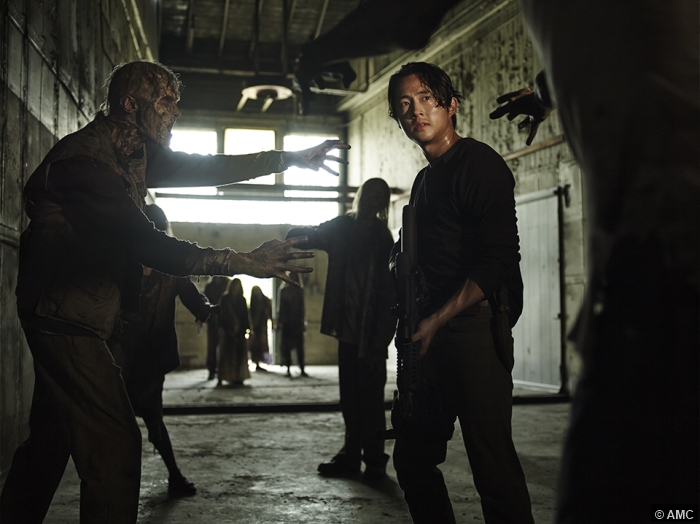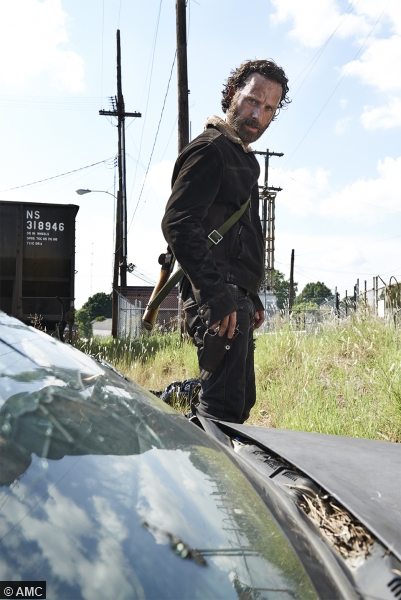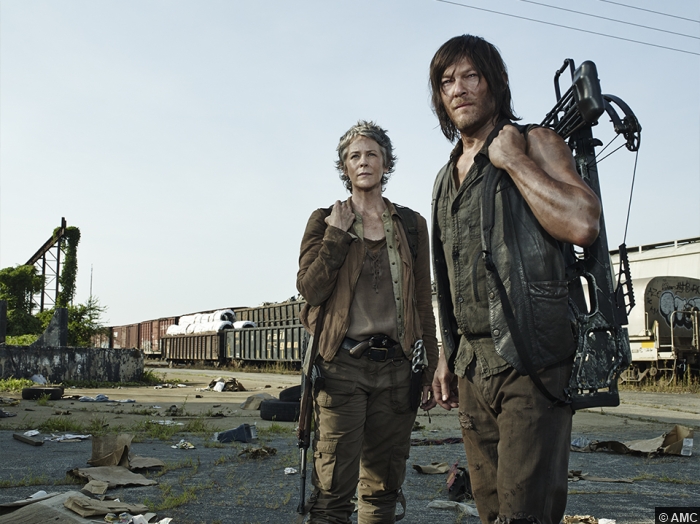It’s interesting to think about how The Walking Dead has evolved as a TV show over the years. Through multiple changes in the writers room (especially at the top) and a gradual change in the scope of the show, TWD has gone from being a small episodic version of “Day of the Dead” to being something more akin to a post-apocalyptic thriller from George Miller.
One can’t help but wonder what the show would have been like had series-developer Frank Darabont not been dumped by AMC executives. The Walking Dead’s first year started out with a highly rated premiere episode. Ratings remained high throughout the condensed first season, but there was no way to be sure such things would last. Darabont was canned at the end of the first season, a six-episode tear that moved with determined pace, was loaded with scares and featured a core cast of characters fighting to survive against overwhelming odds.
Then season two happened and the show turned into “Rob Zombie presents: Little House on the Prairie.”
____________________
The forward momentum of the first year stopped, the threat of the zombies was diminished, family drama replaced much of the horror and the show took its first real deviations away from the comic book source material. Much of the changes were as a result of a slashed budget by AMC. The show was a big hit and the thought from the executives was the show would remain a hit with reduced costs, thus bringing in more money to the network. Many fans were outraged at such petty capitalism, but their anger was drowned out by the news that ratings were higher in season two than season one, and would only continue to climb.
Many shows have started strong and then fizzled (Agents of Shield has lost a full two thirds of its viewers from its series premiere), but Walking Dead’s appeal has only increased the more vehemently. Its five fall premieres have brought in: 5 million US viewers, then 7 million, then 11 million, then 16 million, and finally 2014’s fall premiere was seen by over 17 million viewers.
Despite a dip in quality in season two the viewers could not get enough of the show. It’s not that there isn’t any use in wondering what Darabont would have done differently; it’s that it doesn’t matter: This show seemed destined to be mega hit, no matter who was running it.

Success like its had, to grow exponentially every year, is almost unheard of in television. A throwaway explanation would be that as cable television continues to make up a larger share of the TV-watching populous, ratings for cable shows will increase across the board. But no other show has seen it’s audience grow by more than TRIPLE, at least not shows that started out with such strong numbers. Breaking Bad, AMC’s other runaway success story, started out being watched by a paltry 1.4 million homes. It was near cancellation as the second season (which premiered to 1.6 million viewers) concluded. Its third season continued the upward trend, but it still opened to only 1.9 million viewers. In three years, Breaking Bad’s audience grew, yes, but it only grew by only half a million. By the end of The Walking Dead’s third season, the show had increased from 5 million viewers to a staggering 12.4mm: More than double. That’s not just a successful show; that’s a pop-culture phenomenon.
The question now is “How long can it last?”
____________________
Through all of the changes, both in terms of the creative team (which were substantial at first but now seemed to have settled down) and in terms of the deviations from the comic (which were minor at first but now are so vast they might as well be entirely different properties), the one constant in The Walking Dead has been “the walking.”
The title itself is actually a pun; the first time you see it you think it refers to the zombie infestation that has taken over, and while that is an apt description for the “walkers” on the show, the original meaning referred to the band of survivors led by Rick Grimes. As Rick adds and loses members to his makeshift family, the realization that all of them are eventually going to die sets in. “WE are the walking dead” he declares, pointing out that it’s only a matter of time before death takes them all.

Because of the nature of the setting, the idea that there can be a concrete resolution to the series’ primary narrative (survivors looking to rebuild after a zombie apocalypse) seems outlandish. The show has done such a job of convincing viewers that society is gone that the idea that the series finale could end with smiles and the promise of a happy tomorrow is laughable. The best that The Walking Dead can hope for in terms of an eventual series finale is a small personal victory that leads the heroes to recognize that even though the world is gone, the struggle for survival will never die.
That’s nice and poetic, but it’s going to leave a great number of the viewers angry; viewers who want resolution and a happy ending are going to rail against anything else. How long before these viewers see the writing on the wall, tire themselves of the pattern of the show and grow frustrated that “nothing ever happens”?
The pattern of the show, of course is this:
1) Rick and co. head to a location that seems hopeful
2) Location is not as nice as it appeared
3) fight between zombies and/or other people
4) Rick and co. leave to look for a location
5) Internal drama abounds as the prospect of better days ahead seems nil
6) Suddenly, Rick and co. hear of a location that seems hopeful...
and repeat.
Don’t get me wrong, it’s a formula that has worked since season one’s crew headed to the CDC. Then there was the Farm. Then the Prison. Then Terminus. Then Washington D.C.
Now the show is in Alexandria, which will of course show itself to be far from a place to lay down your burdens. After Alexandria is over, the crew will pack up and head for the next Emerald City, and the cycle will continue. How long can it go on before viewers get antsy?
_____________________
The brilliant Breaking Bad ended after five years, because there was no more story to tell. Vince Gilligan saw the end of his tale and did not succumb to the greed that so many in his position do; he could have easily added more to the story and stretched things out, branching it off for multiple more seasons. Wisely he recognized that diminishing returns would have seen the show fizzle out and die with a whimper the way Lost, Smallville, Scrubs, and others have over the years (dating back to I Love Lucy and The Andy Griffith Show). Instead he ended on a high note, wrapped up the story in a definitive fashion and now can sit back and rake in the Netflix co-signed royalty checks.

Supporters of The Walking Dead say their show is not designed to be so open-and-shut. The story TWD is telling is not about saving humanity from zombies, but about surviving it from itself. That’s fine and certainly true, at least since the end of the first season: The human vs human struggle has yielded much more drama than the human vs zombie struggle (even if the latter is more preferred by the casual viewer). But eventually the greater portion of the casual viewers is going to catch on to the bait-and-switch formula the show has built itself on.
When that happens the show’s creators might need to change the focus from “walking” to “arriving” and consider ending on a high note, lest they risk fizzling out and ruining the goodwill 17 million viewers (and counting) have bought them.
~cultofwhatever.com


Kung Fu (TV series)
ReplyDelete